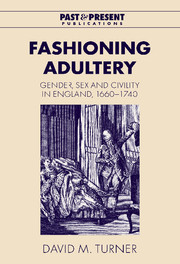Book contents
- Frontmatter
- Contents
- Acknowledgements
- Note on the text
- List of abbreviations
- Introduction
- 1 Language, sex and civility
- 2 Marital advice and moral prescription
- 3 Cultures of cuckoldry
- 4 Sex, death and betrayal: adultery and murder
- 5 Sex, proof and suspicion: adultery in the church courts
- 6 Criminal conversation
- Conclusion
- Bibliography
- Index
- Past and Present Publications
Conclusion
Published online by Cambridge University Press: 01 July 2009
- Frontmatter
- Contents
- Acknowledgements
- Note on the text
- List of abbreviations
- Introduction
- 1 Language, sex and civility
- 2 Marital advice and moral prescription
- 3 Cultures of cuckoldry
- 4 Sex, death and betrayal: adultery and murder
- 5 Sex, proof and suspicion: adultery in the church courts
- 6 Criminal conversation
- Conclusion
- Bibliography
- Index
- Past and Present Publications
Summary
[Adultery is] a Crime that breaks through all Covenants, confounds all Races and Families, disturbs and unsettles all Inheritances, and fills the whole World with Tumult and Madness and Confusion.
The nature of [adultery] is political and variable; not physical and invariable … its degree of civil or even moral turpitude depends on manners and opinions; on times and circumstances.
In the eyes of seventeenth-century religious moralists, adultery was a great sin for which all those who committed it were considered equally deserving of punishment. Not only did it affect the individuals concerned and their families, but it was also a great offence to God and, due to the organic conception of society, threatened political as well as familial disorder. However, over the course of the later seventeenth and early eighteenth centuries, as previous chapters have shown, the unity of moral vision that underpinned these arguments began to break down. Changes in patterns of moral policing, in ideologies of the family and its relationship to structures of political authority, together with new thinking about gender roles and social differentiation raised questions about the validity of traditional understandings of marital infidelity. The language of sexual immorality, seen by moralists as a key guardian of moral standards, diversified and new forms of legal action developed which appeared to judge adultery more in terms of rank and the degree and type of injury it caused.
- Type
- Chapter
- Information
- Fashioning AdulteryGender, Sex and Civility in England, 1660–1740, pp. 194 - 204Publisher: Cambridge University PressPrint publication year: 2002

